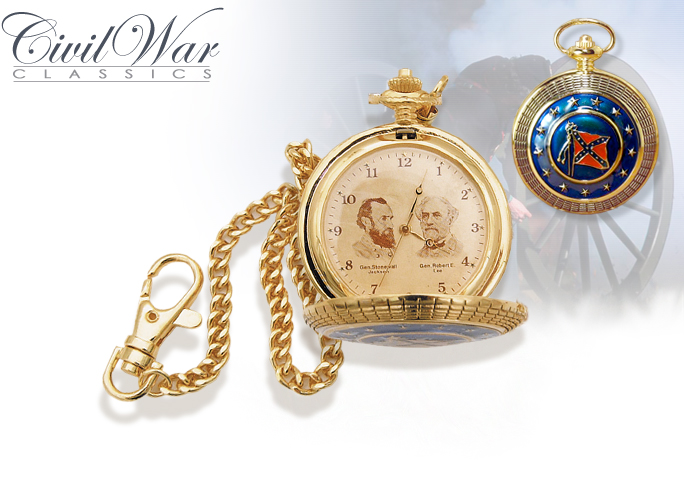CONFEDERATE GENERALS POCKET WATCH IW38 INFINITY IW38 INFINITY
This Infinity Confederate Generals Pocket Watch features a Gold face with gold hands and antiqued image of Generals "Stonewall" Jackson (pictured left) and Robert E. Lee (pictured right). The polished Gold finish durable cast metal watch casing is sculpted in fine detail and features an enameled image of Confederate flag on front circled in stars. This Civil War themed pocket watch includes a deluxe Gold finish metal chain. Watch feature: hour minute and second hand, Japanese quartz movement, and includes a green gift display box with silkened interior.
|
|

• Dimensions: 3.6 x 3.4 x 1.6 inches
• Japanese quartz movement
• Weight: 5.6 ounces
|
 |
 |
 |
Thomas Jonathan "Stonewall" Jackson (January 21, 1824 – May 10, 1863) was a Confederate general during the American Civil War, and one of the best-known Confederate commanders after General Robert E. Lee. Military historians consider Jackson to be one of the most gifted tactical commanders in U.S. history. His Valley Campaign and his envelopment of the Union Army right wing at Chancellorsville are studied worldwide even today as examples of innovative and bold leadership. He excelled as well in other battles; the First Battle of Bull Run (First Manassas) where he received his famous nickname "Stonewall", Second Bull Run (Second Manassas), Antietam, and Fredericksburg.

Robert E. Lee - Born on January 19, 1807 in Stratford, Virginia, Robert E. Lee came to military prominence during the U.S. Civil War, commanding his home state's armed forces and becoming general-in-chief of the Confederate forces towards the end of the conflict. By early 1865 the fate of the war was clear, a fact driven home on April 2 when Lee was forced to abandon Richmond. A reluctant and despondent Lee surrendered to Grant at a private home in Appomattox, Virginia. "I suppose there is nothing for me to do but go and see General Grant," he told an aide. "And I would rather die a thousand deaths." Though the Union won the war, Lee has been revered by many while others debate his tactics. He went on to become president of Washington College. |
 |
 |
 |
|